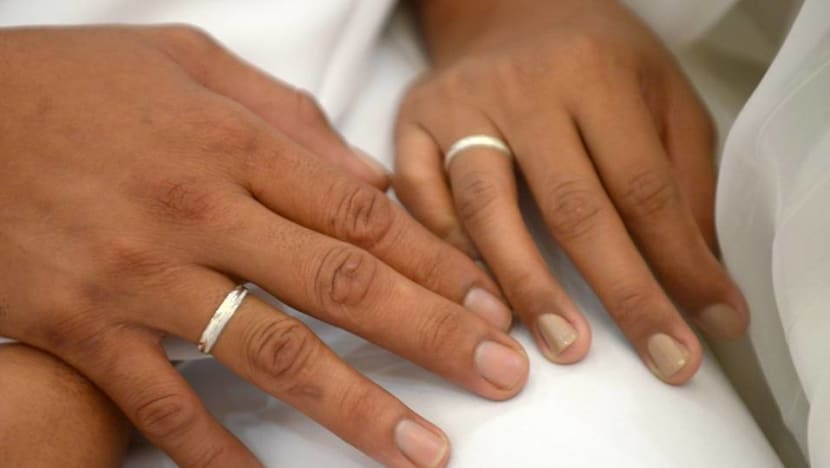More couples seek counselling as circuit breaker, working from home put strain on marriages

File photo of wedding rings. (Photo: AFP/Jay DIRECTO)
SINGAPORE: After months of fighting and added stress at home, Jack and Rose* considered getting a divorce due to “deep levels of hurt” resulting from tensions during the COVID-19 “circuit breaker” period.
With everyone at home, there were more chores and cleaning up to do. As schools were closed, they also had to supervise their seven-year-old child doing home-based learning.
Speaking to CNA about the couple’s experience, chief wellbeing officer of the Singapore Counselling Centre (SCC) John Shepherd Lim said: “The wife, being the main caregiver, was highly stressed out and was frustrated at the fact that her husband was not helping around the house despite his presence at home.”
This is a “very typical situation” for families during the circuit breaker period, Mr Lim noted, adding that the “levels of hurt” and “extent of relational strain” in the case of Jack and Rose were due to the tone and abrasiveness when the couple communicated with each other.
The real names of the couple were not given because of confidentiality issues.
“The wife accused her husband of being useless and nonchalant, causing the husband to feel unvalidated as he worked hard to feed the family; the husband accused his wife of being noisy and irritating, causing the wife to feel all the more upset as her feelings were not understood,” said Mr Lim.
The couple are not the only ones seeing tensions at home escalate after extended periods of staying home and working from home together. Therapists and counsellors CNA spoke to saw an increase in the number of couples and individuals approaching them because of relationship problems.
CHALLENGES ADJUSTING TO NEW ROUTINES
Alliance Counselling saw about 30 to 40 per cent more couples and individuals over the past six months, said counsellor Martine Hill.
Working from home together puts more strain on couples because their daily routines have been disrupted and they find it challenging to adjust to the changes, said Ms Hill.
“They haven't learned how to set appropriate boundaries around who is doing what. How are they going to split their time? Who gets the computer? And in some ways there are many factors that can be influencing them, particularly the actual confinement of space,” she added.
With the COVID-19 pandemic, life as they knew it has disappeared, and many people were not able to explain what they were experiencing, said Ms Hill.
“They knew that they were so tired. They knew that they were feeling sluggish, but weren't able to put into words what they were experiencing ... Therefore, they’re often more irritable or less patient with people around them, but they weren't able to communicate,” she added.
“So it was kind of like - why are we getting into these arguments? Why are we getting into big fights? Why am I so irritable? Why is everybody driving me crazy?”
LESS PERSONAL SPACE, BLURRED BOUNDARIES
At SCC, Mr Lim saw a 20 per cent increase in the number of couples going for counselling sessions over the past six months compared to earlier this year.
Decreased personal space is a “major stressor”, said Mr Lim. “In every relationship, it is healthy for couples to maintain a good balance of personal and shared space, as personal space allows the individual to retain a sense of self and identity as well as meet their own wants and needs.”
“When tensions do arise, having to go to work can serve as a much-needed reprieve for both parties to calm down, allowing them to be in a better state of mind to deal with the conflict calmly when they get back,” he added.
“However, having to face each other for long periods of time at home tends to cause individuals to feel frustrated, thus reducing the emotional capacity of both parties to tolerate and enjoy each other."
Having both partners working from home also “blurs the work-family boundaries”, said Mr Lim.
Before the pandemic, people could focus on work in the office and dedicate time to the family when they are at home. However, the presence of family members or children in one’s workspace at home could result in conflicts in work and family demands, he added.
“With the added demand of having to tend to family needs, differences in expectations and values when it comes to the distribution of load in this aspect is also a common point of conflict,” said Mr Lim.
Those who work longer hours may expect their partners who do not have jobs or who finish work earlier to take on more household responsibilities, noted Ms Hill. “It could be something like ‘If you finished early how come you didn't make dinner?’”
READ: Retrenchments in Singapore spike in first half of the year, surpassing SARS peak: MOM
Counsellors also noted that monetary and job issues were another factor in many disagreements among couples they saw.
“There can be the pressures of not knowing if they have a job, or maybe they've already lost a job. There’s an external pressure of money. There's also the external pressure of not knowing how long this will last,” said Ms Hill.
“And then there’s the thing about whose job is more important,” she added.
MORE ENQUIRIES ABOUT DIVORCE
While the Family Justice Court said it “has yet to see a rising trend in the number of divorce applications filed”, several lawyers told CNA that they have had more enquiries since the start of the circuit breaker.
Lawyer Gloria James-Civetta from Gloria James-Civetta & Co said that the firm received between 60 and 80 calls and emails per month from April to June from people looking to get a divorce.
On the reasons commonly cited for divorce and separation, Ms James-Civetta said: “Being confined with the person 24/7 made them realise that it is inevitable and no point prolonging the suffering.”
Lawyer Nureliza Syahidain Effendy from IRB Law LLP said she has seen at least 20 per cent more divorce enquiries since April, with many couples specifically citing the circuit breaker as a reason.
“Prior to (the circuit breaker), they would actually say … oh this person is unreasonable, because of our character differences et cetera, we are not able to remain married to each other.
“But when it comes to the circuit breaker itself, they actually quote those reasons specifically, (saying) that because of the recent circuit breaker, we realised that we are not compatible, and I am unable to stand this kind of behaviour for too long,” she said.
Financial issues are another reason cited. With people losing their jobs or being forced to go on no-pay leave, these stressors could take a toll on the marriage, Ms Nureliza said.
Some have filed on the basis of family violence.
Citing a case that she is handling, Ms Nureliza said the woman sought help from the firm as a victim of domestic abuse.
“And then, later on, she decided that look, because of this domestic abuse, I don't think I can tolerate this behaviour; it's very stressful for me, it’s very scary to stay with a person who has displayed this kind of behaviour to me. So she has decided to proceed with her divorce.”
Such cases make up a significant portion of recent divorce enquiries, she said, attributing it to the rise of domestic violence over the circuit breaker.
READ: 22% increase in family violence reports since start of circuit breaker period: SPF
READ: COVID-19: MSF keeping 'close watch' on domestic abuse cases as more reach out for help over circuit breaker period
But not all couples eventually go through with the divorce. Some started proceedings, only to ask later if they can withdraw from the process.
“I say, sure. Whichever works for you because at the end of the day, make sure that whatever decision (you’re) going to make is not something that (you) will regret in the future, just over a one-time incident,” Ms Nureliza said.
SETTING BOUNDARIES AND COMMUNICATING BETTER
In resolving tensions in the relationship, therapists said couples should set time and space boundaries to ensure a balance of personal and shared space.
This could include having fixed work spaces in separate rooms. They could also discuss which parts of the day they would prefer not to be disturbed, while committing to being more present at home for other parts of the day, said Mr Lim.
Dr Tracie Lazaroo, a clinical psychologist at Inner Light Psychological Services and LP Clinic, said couples should manage expectations of each other and fine-tune communicative skills to facilitate conflict resolution.
“It was also important to teach couples how to manage their anxiety and uncertainty over the lockdown to prevent them from becoming an echo chamber with each other where their projected discomfort and worry creates more tension and strain within the relationship,” she added.
Partners should also be mindful that both parties are going through a difficult period, with “heightened demands and emotions”, said Mr Lim.
“Being self-aware about the increased emotionality one is experiencing would allow the individual to take a step back to recognise the impact that the external environment has on the relationship.”
He added: “While the COVID-19 situation has caused much abrasion in relationships, it has also surfaced many problems in our communication and relational styles that need work. If handled well, we would emerge from this crisis stronger and closer.”
BOOKMARK THIS: Our comprehensive coverage of the coronavirus outbreak and its developments
Download our app or subscribe to our Telegram channel for the latest updates on the coronavirus outbreak: https://cna.asia/telegram
















